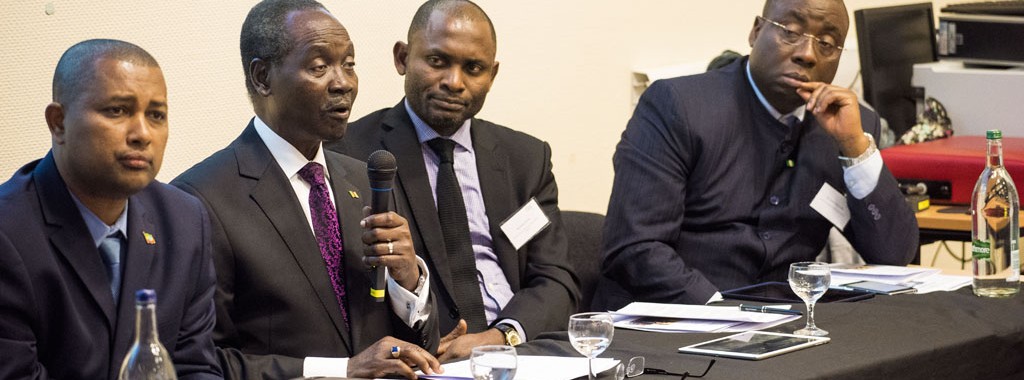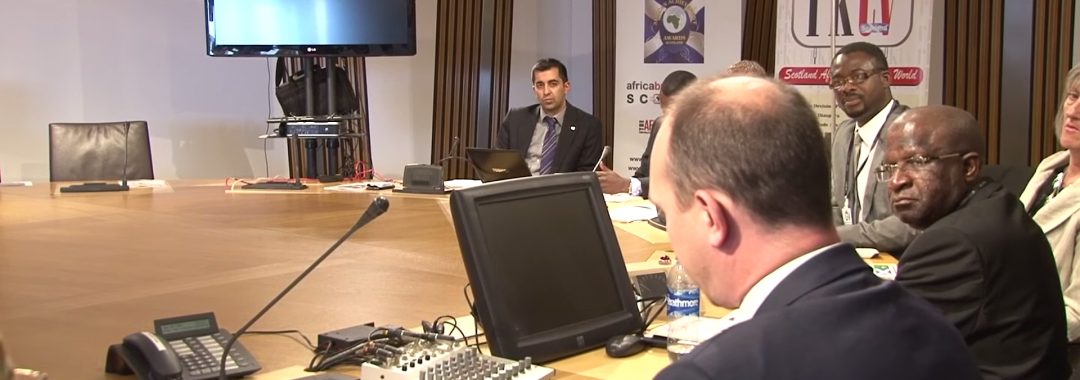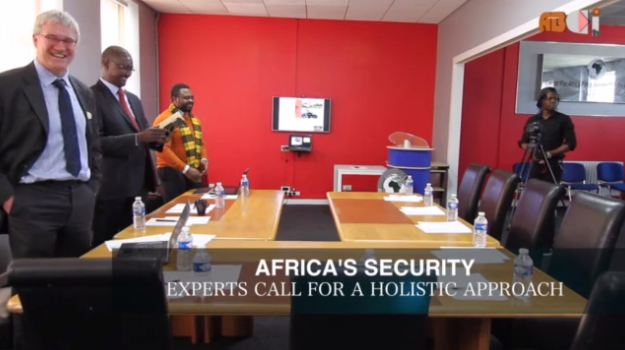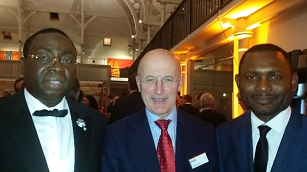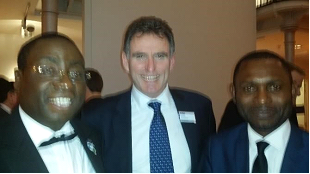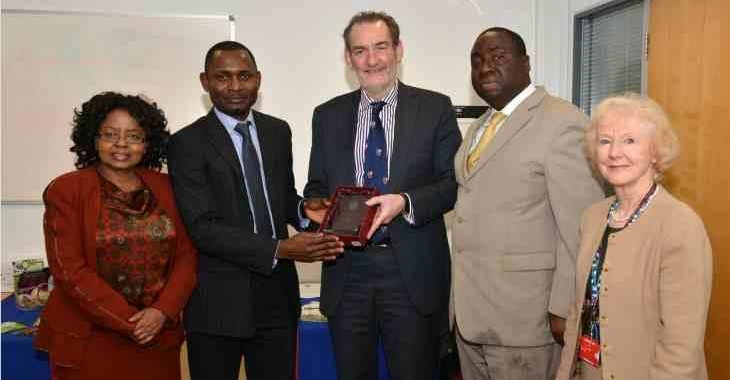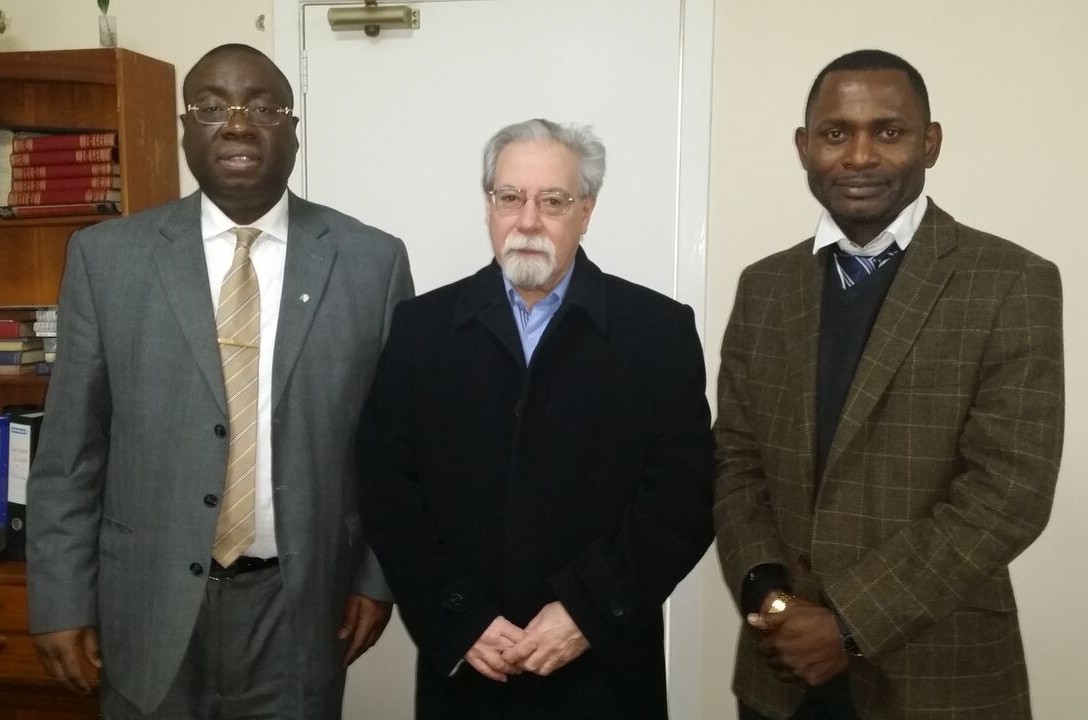THE AFRICA DEBATE
UWS, Paisley, 12 November 2015
AFRICAN ENTERPRISE & ECONOMIC DEVELOPMENT
A PROUD HISTORY – A PROMISING FUTURE
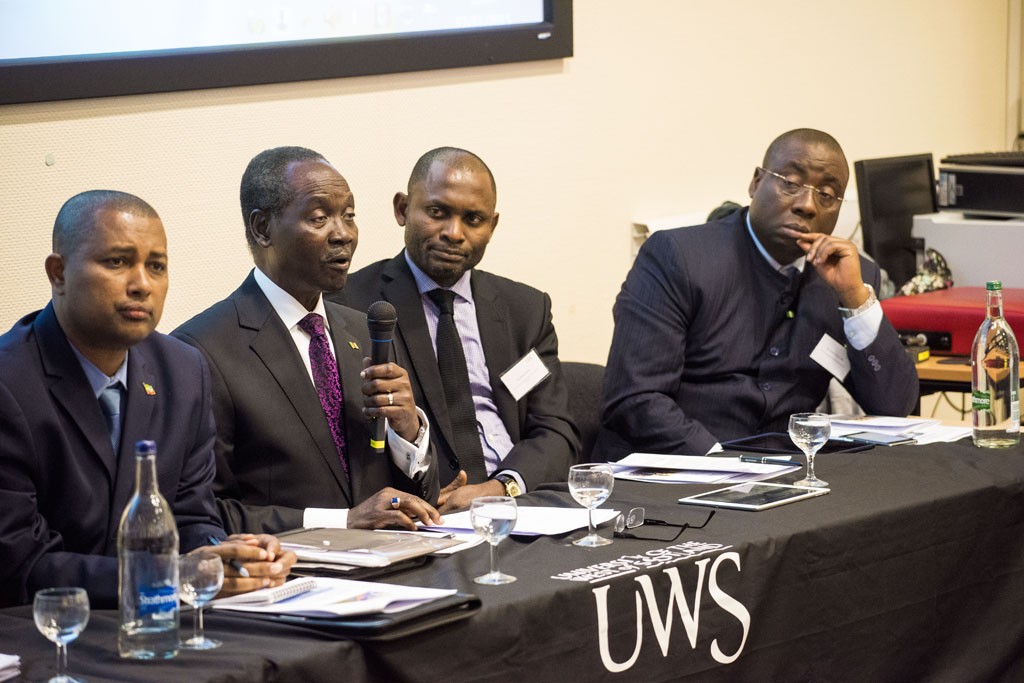
Picture shows the high level panel at the Launch of the University of West of Scotland CAREED unit :
The Commercial Attache from the Ethiopian Embassy, His Excellency High Commissioner Nkwelle Ekaney of Cameroon, Beltus Etchu, CEO and Festus Olatunde, Executive Director Finance and Governance of African Forum Scotland
My own experience as an African is a good illustration of both the formidable challenges that confront this vast continent and the tremendous opportunities that await it.
Africa is the world’s second largest continent – only Asia is bigger – and it is home to more than 1 billion people. The continent also possesses about 10% of the world’s petroleum reserves, and it holds about 90% of the world’s cobalt, 90% of the world’s platinum, 50% of the world’s gold, 98% of the world’s chromium, and one-third of the world’s uranium. There are also vast tracts of farmland under cultivation, producing everything from maize and wheat to asparagus and wine grapes. For example, Agriculture is Africa’s largest economic sector, representing 15 percent of the continent’s total GDP, earning more than $100 billion annually. It is highly concentrated, with Egypt and Nigeria alone accounting for one-third of total agricultural output and the top ten African countries, generating 75 percent of the continents production.
Africa’s agro-ecological potential is massively larger than its current output, however, so are its food requirements. While more than one-quarter of the world’s arable land lies in this continent, it generates only 10 percent of global agricultural output. So there is huge potential for growth in a sector now expanding only moderately, at a rate of 2 to 5 percent a year.
There are 54 independent countries in Africa today, containing incredible cultural diversity, with more than 3,000 different languages spoken throughout, each one representing a unique cultural tradition. This continent also lays claim to the world’s most ancient Christian communities and its oldest Islamic universities. For example, as we know, Timbuktu was not only a great intellectual centre of the West African civilisations of the Mali and Songhai empires. It was also a splendid scientific centre and a major contributor to European scholarship and development in the Middle Ages and the Renaissance. Its remaining, incomplete, collection of books and manuscripts leaves us in no doubt as to the magnificence of its intellectual contribution.
Sadly, Africa also possesses a history stained with colonialism and slavery.
This dark period, which lasted well into the 20th century, was traumatic for Africans in many profound ways, emotionally, physically, socially and economically. While countries in Europe, America and Asia focused on building modern global economies after World War II, Africa’s best and brightest struggled to take control of their own destinies.
A New Beginning
I am happy to say that the struggle for independence is well behind us. My kids will only learn about it from their history books. Africa is producing 700,000 university graduates every year. Graduates who are concerned about the future and motivated to transform the continent and to integrate it into the global economy.
Africa’s nations are moving to the next level and emerging together around their common linguistic, social and economic bonds. Since 1975, 15 countries have been working together in the Economic Community of West African States. The mission of ECOWAS is to promote economic integration and foster collective self-sufficiency.
In the South, the Southern African Development Community was established in 1980 to facilitate socio-economic cooperation and integration among its 15 member states.
The Common Market for Eastern and Southern Africa stretches from Libya to Zimbabwe. Formed in 1994, the COMESA & CEMAC groups aim to create a fully integrated, internationally competitive regional economic community.
This kind of cooperation bodes well for the future.
Sure, progress is slow. But, we shouldn’t forget that the European Community required more than 50 years to arrive at its present state of social and economic integration and that ASEAN grouping, founded in 1967, have only recently begun to deliver real economic benefits to its member states.
I have faith and confidence that we will continue to see African states cooperating more and more closely for common benefit. I think 50 years from now we will see four or five well-integrated regional entities seamlessly engaged in trade with one another and with the rest of the world.
Investment Is Flowing
This accelerating trend toward economic cooperation and integration comes as the populations of Asia and Latin America become more affluent and there is increasing demand for energy, food, housing and basic consumer goods. As Africans continue to develop their economy, they will be in a good position to supply these commodities to the world and to do this efficiently and at reasonable price levels. Already, trade between Africa and China topped US$100 billion in 2010. Trade with India was over US$50 billion. In fact, the volume of trade between Africa and Asia was higher in 2010 than the trade between Africa and all the other regions of the world combined.
Of course, sustaining this growth for the long term will require tremendous investment in infrastructure and production, especially if African businesses are going to emphasize value-added manufacturing to complement and even surpass, revenues from the export of energy and natural resources. Again, I am optimistic. The global economy is really a simple system at heart. Money flows to areas which have the greatest potential for investment returns and profit and Africa is looking very attractive to both offshore and onshore investors right now.
Unfortunately, this success story is not well known outside of Africa. Although famines and civil wars generate spectacular images that are prominently reported on the front pages of newspapers around the world. For example, when someone like Nigerian-based billionaire Aliko Dangote invests a billion dollars in an African industrial project, it almost never makes headlines. I guess images of progress just do not sell newspapers. There are many investors like Mr. Dangote within the African continent who are putting their ‘smart’ money behind crucial infrastructure and industrial projects. A recent study conducted by a respected African NGO reported that African countries collectively received about US$50 billion in investment from outside the continent during the most recent year for which statistics are available. But this amount represents only about 30% of the total investment in Africa for that particular year. The other 70% was generated from sources inside Africa.
Our African Forum Scotland Role
Our own particular contribution, appears on the face of it to be small but is in fact potentially significant and very impactive. We at African Forum Scotland are committed to helping Africa achieve its great potential and to help raise the disadvantaged from the pervasive, ever recurring blight of the Poverty Trap. Our vision is to use cutting edge knowledge, scientific, entrepreneurial and technical and apply this knowledge to the existing proven wisdom and practices, already proven and applied by Africans artisans today. During the past 4 years, we have worked alongside the International Development team of the United Nations Association in Scotland to identify and focus solely upon specific economic sectors where we know we can really make a difference. We are therefore concentrating solely on 4 key deliverable sectors – Oil, Gas & Energy, Mining, Telecommunications and Banking and Finance and the common denominator of helping deliver sustainable capacity building, educational, teaching and coaching programmes. To expedite matters we are endeavouring to implement these programmes alongside the fast, decisive, decision making Private Sector as our expert and associate partners.
We also strive to do so in an ethical manner as best as we can in the contexts of circumstance and geo-political acquiescence. To help attain our required standards, we have also taken the bold step of identifying sensitive and socially responsible Private Sector experts as our designated partners to help us deliver quicker results. We are also harnessing the qualifications and expertise of the African Scots diaspora and training them so as to soon work as AFS outreach management teams within Africa.
All our undertakings are firmly based upon replacing African dependency upon Aid Funding as the prime development factor in far too many African nations. We fully respect and admire Aid’s magnificent contribution in addressing emergency relief challenges but dependence upon Aid as a means to generate economies and to create employment over past decades, has simply failed. Quite simply and for years, well intentioned benefactors have delivered top down, percolating, unconditional funds into Africa which rarely, if ever, reach their intended targets nor the intended recipients. Furthermore, little heed has been taken to ask Africans what they really need and what they in fact want.
Instead, we at African Forum Scotland are convinced that attracting funds, resources and expertise to generate Trade is the answer to Africa’s sustainable transformation. Such resources must be invested in entrepreneurial initiatives to help educate and generate quality and quantity improved produce and market surpluses to help local, regional, provincial, state and indeed, national market places to emerge. As touched upon previously, we at AFS champion ‘transformation’ as our benchmark. Anything less we ignore as alternatives merely deliver change which is short term and reversible.
As a prime example of our work and aspirations, our endeavours are accordingly committed to the creation of local markets. Put simply, our expert teams listen carefully and learn about the talents, resources and expertise of local artisans and then complement their talents by applying cutting edge knowledge and modern techniques to help them surpass traditional results and performance levels. Our innovative add-on packages and training is further complemented by helping local people understand entrepreneurial marketing skills to use their newly attained surplus goods and services to stimulate new marketplaces.
A strong AFS example is easily demonstrated in agro-forestry. The two main ingredients required to create market surpluses in farming is land and labour. Africa has these in abundance and the added bonus being that agricultural surpluses address Food Shortages and employment and income derived, address the pernicious Poverty Trap. By teaching soil regeneration and selective plant husbandry, our techniques now help deliver yields and improved quality returns ranging from 6 – 10 times traditional levels. As an added bonus, in Cameroon and Tanzania, where our teams have operated pilot schemes, more women are employed and young people have now no need for embarking upon the risks which come from urban migration. Family units are held together and the more ambitious and entrepreneurial young farmers see the commercial potential of this initiative and look to new and more commercial agro-forestry models for economic opportunities.
Successful agricultural systems as described, require reliable access to financing and we are exploring Bank Account facilities for women especially with an African Bank, We are in addition, now also exploring ‘Fairtrade’ produce links with a Private Sector partner so as to focus production to their needs and help create an emerging African green revolution. There are logistical problems of course – a successful agricultural transformation requires some basics to be in place—transportation and other kinds of infrastructure, stable economies, more open borders and experimentation on harvest longevity, designed to enable and underpin farm exports.
The great advantage and opportunity we have is that AFS’ sector solutions are effective and ‘fit for purpose’. Our models are cost effective, proven and are user friendly and easily understood. They enable insights to be easily understood by practitioners and are readily adopted and quickly embedded. We are also committed to investing part of our own eventual profits back into socially deserving African Sector causes.
I commend this AFS African briefing and stratagem to your consideration.
Beltus Etchu
CEO, African Forum Scotland
CEO, Next Step Initiative
Founder and Director, Centre for Policy and Research Development Scotland

